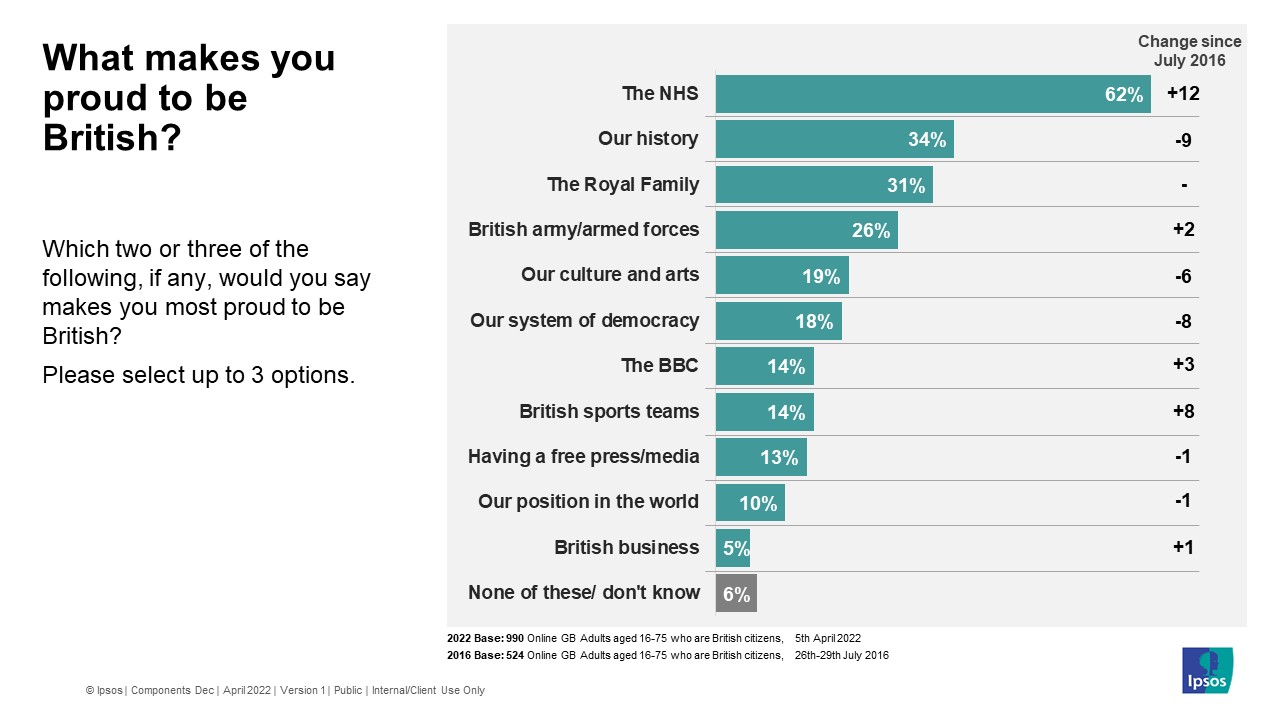6 in 10 would rather be a citizen of Britain than any other country in the world – the NHS, our history and the Royal Family are most likely to make them proud to be British
New research from Ipsos, ahead of St. George’s Day on 23rd April, shows a majority of British citizens agree with the statement, “I would rather be a citizen of Britain than of any country in the world,” 6 in 10 (60%) agree while only 13% do not. This is broadly in line with the results six years ago in 2016. Older Britons (70% of 55-75 year olds) and 2019 Conservative voters (76%) are most likely to agree.
When asked what makes people most proud to be British, the NHS is named by 6 in 10 (62%), making it by far the most popular option. Around a third say our history (34%) and the Royal Family (31%) make them most proud to be British. On the other hand, British business (5%), our position in the world (10%) and our free press/media (13%) appear to have less impact. Compared with 2016, more people are likely to pick the NHS and British sports teams, but fewer people mention Britain’s history or system of democracy.

As we get ready to celebrate the patron saint of England, the research shows 63% in England are correctly able to identify when St George is honoured (23rd April). One in 5 (21%) don’t know when St George’s Day is while 15% selected wrong dates, such as 8% who say 17th March, which is in fact St Patrick’s Day.
Half of people in England say they plan to do something to celebrate St. George’s Day this year (51%), most likely going for drinks in the pub (23%), getting together with friends/family (22%) or going for a meal in a local restaurant (14%). Around 1 in 10 will attend a local community event (12%) or dress their house in red and white flags (9%).
When thinking about the use of red and white England flags, most are supportive. When seen on houses, cars, pubs, shops, etc. on St George’s Day, 7 in 10 (69%) say it is a healthy expression of national pride, a similar proportion feel the same if they see flags on display while England is playing in the World Cup (68% - which has risen from 57% in 2013). While still a majority, fewer are supportive of people displaying England flags on a normal day of the year. When considering this, 56% say it is a healthy display of national pride while 1 in 6 (17%) believe it is a worrying expression of English nationalism. In 2013, 53% believed this to be a healthy display of pride, but 11% saw it as a worrying expression of English nationalism.
Younger people, and Labour and Remain are more likely to view the display of England flags as a worrying display of English nationalism. For example, 28% of 16-34-year olds, 30% of Labour voters, and 25% of Remain voters believe it is a worrying sign if they are displayed on a normal day of the year.
Gideon Skinner, Head of Political Research at Ipsos, said:
Despite the issues facing the country, most of us are still proud to be British, with the NHS in particular acting as a unifying force across all groups of society as something to believe in – especially so given the experiences of the pandemic. We may even be seeing some impact from the feel-good factor around Gareth Southgate’s England team with an increase in the proportion who think flying the St George’s flag during a World Cup is just a healthy expression of English pride. Overall, this is a reminder that it is only a minority who do not feel proud to be British – but there are still some potential faultlines. For example, different generations and different ends of the political spectrum have different views when it comes to Britain’s history and system of democracy.
Technical note:
- Ipsos UK interviewed a representative quota sample of 1,036 adults aged 16-75 in Great Britain. This includes 990 who described themselves as British citizens, while 885 of the interviews were held with respondents residing in England. Interviews took place on the online Omnibus using the Ipsos.Digital platform on 5th April 2022. Data are weighted to match the profile of the population. All polls are subject to a wide range of potential sources of error.




